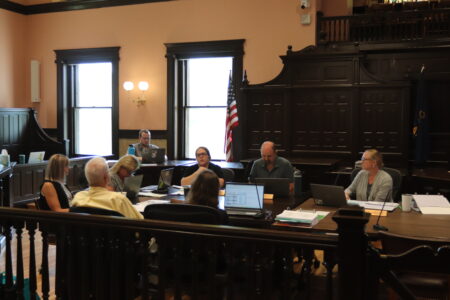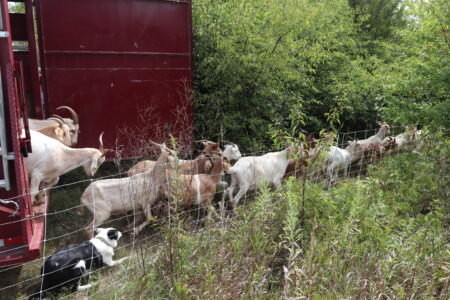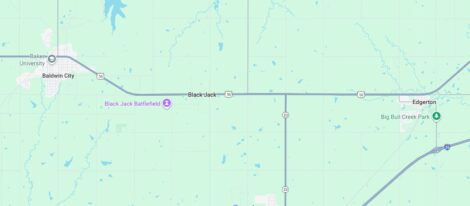Douglas County commissioners set maximum property tax rate for 2026 that’s slightly lower than 2025’s

photo by: Josie Heimsoth/Journal-World
Story updated at 8:27 p.m. Wednesday, July 16, 2025:
When Douglas County started working on its budget for 2026, county staff wanted to hold the property tax rate at the same level as it was for 2025.
But on Wednesday, county commissioners decided it could go a little bit lower.
The County Commission voted unanimously Wednesday to set the maximum property tax rate, or mill levy, for the 2026 budget at 40.669 mills, a slight decrease from the 2025 rate of 41.298 mills. The mill levy has not yet been finalized, but now that this maximum has been set, the commission can no longer raise the mill levy for 2026 higher than that, though it can still lower it.
The decision comes after several days of deliberations on the 2026 budget, and it would mean that the county would bring in $1.3 million less in tax revenue than the flat rate of 41.298 mills that was originally proposed in the budget.
Commissioner Patrick Kelly said that the mill levy calculations were about finding a balance to address inflationary pressures and the rising costs of providing county services.
“I’m really proud of the work the commission has done to keep the mill levy as low as possible and still provide the services and resources that are so important,” Kelly said. “I think this is a reasonable number.”
While the maximum mill levy may be lower than what was proposed, it’s still above what is referred to as the “revenue neutral rate” — the mill levy required to raise the same amount of property tax revenue as the prior year, using the current year’s assessed valuation amount. According to a memo to county commissioners, that rate would be 38.958 mills, and the commission on Wednesday also authorized staff to inform the county clerk of their intent to exceed that rate.
Property tax rates are just one part of the equation that produces your property tax bill; the other part is the assessed value of your property. If your assessed value goes up, you might still be paying more, even if the property tax rate falls.
One mill is equal to $1 per $1,000 of a property’s assessed value. With the mill levy at 40.669 mills, a homeowner with a $600,000 home would pay $2,806 in property taxes to the county. A $300,000 property would have a bill of $1,403, and a $200,000 home would incur $935 in taxes.
The total assessed property valuation in Douglas County increased by 5.7% in 2025, compared to 6.8% in the previous year.
• • •
Even though the commissioners all settled on a property tax rate decrease, they said they took different paths to get there. As part of the process, each commissioner fills out a “worksheet” to help them draw up their own idea of how the budget should look.
Kelly said while crafting his version of the budget, he set the mill levy aside and looked at each individual funding request independently.
“I find that if I have a mill levy goal, then I’m prioritizing projects that may not be fully fleshed out or fully there yet,” Kelly said. He added that he wants to be able to tell the taxpayers that the requests he’s funding are where the money is needed.
Commissioner Erica Anderson said that she didn’t enter the process with the intention of lowering the mill levy. As this was her first time participating in the county’s budget process, she said she was also assessing each funding request individually based on its own merits.
“I added to the worksheet and reduced on the worksheet depending on each request,” Anderson said. “As I went through that process, the worksheet that I turned in ended up with a reduced mill levy. I did not go in with that actual intent.”
Although she eventually voted with her fellow commissioners for the lower maximum, Commissioner Shannon Reid said earlier in the budget discussions that she did have some reservations about it. Reid told commissioners she was nervous about what might change at the state level when the Kansas Legislature convenes for its 2026 session early next year. The Legislature has considered several proposals focused on local governments’ property tax rates, including potential limits on increases.
“Pushing down the levy just to push it down when we might not have much room to grow it or increase it should we need to in the future makes me a little nervous,” Reid said.
• • •
To wrap up budget deliberations, county commissioners decided on which requests they believe should be funded through the quarter-cent mental health sales tax fund.
County commissioners had several additional funding requests from behavioral health partners that they were interested in funding through the mental health sales tax fund. However, County Administrator Sarah Plinsky informed them that the combined requests would fully utilize the fund’s ongoing $1.6 million capacity for 2026.
At budget deliberations Wednesday morning, county commissioners said they were uncomfortable with using all of the funds designated to continue supporting programs or initiatives throughout 2026 and potentially beyond.
To address the issue, commissioners transferred $496,032 from the mental health sales tax fund to the general fund, leaving nearly $1.2 million in remaining requests to be covered by the sales tax fund. The largest portion — $1 million — has been set aside for crisis system operations. While this is a response to anticipated increasing costs at the Treatment & Recovery Center, commissioners emphasized that the funds are not exclusively designated for the TRC, recognizing that the money might be needed for other crisis services or potentially go unused.
Decisions on the 2026 budget are not yet final. Budget hearings about the revenue neutral rate will be held in conjunction with the public hearings on the county budget and the Consolidated Fire District No. 1 budget for 2026 during the County Commission’s business meeting on Wednesday, Aug. 27, at 5:30 p.m. People can read the entirety of the proposed budget for 2026 on Douglas County’s Budget and Finance page.
In the meantime, there will also be hearings for the five-year Capital Improvement Plan and Douglas County Consolidated Fire District No. 1. Those hearings will begin on Wednesday, July 30, at 4 p.m.







